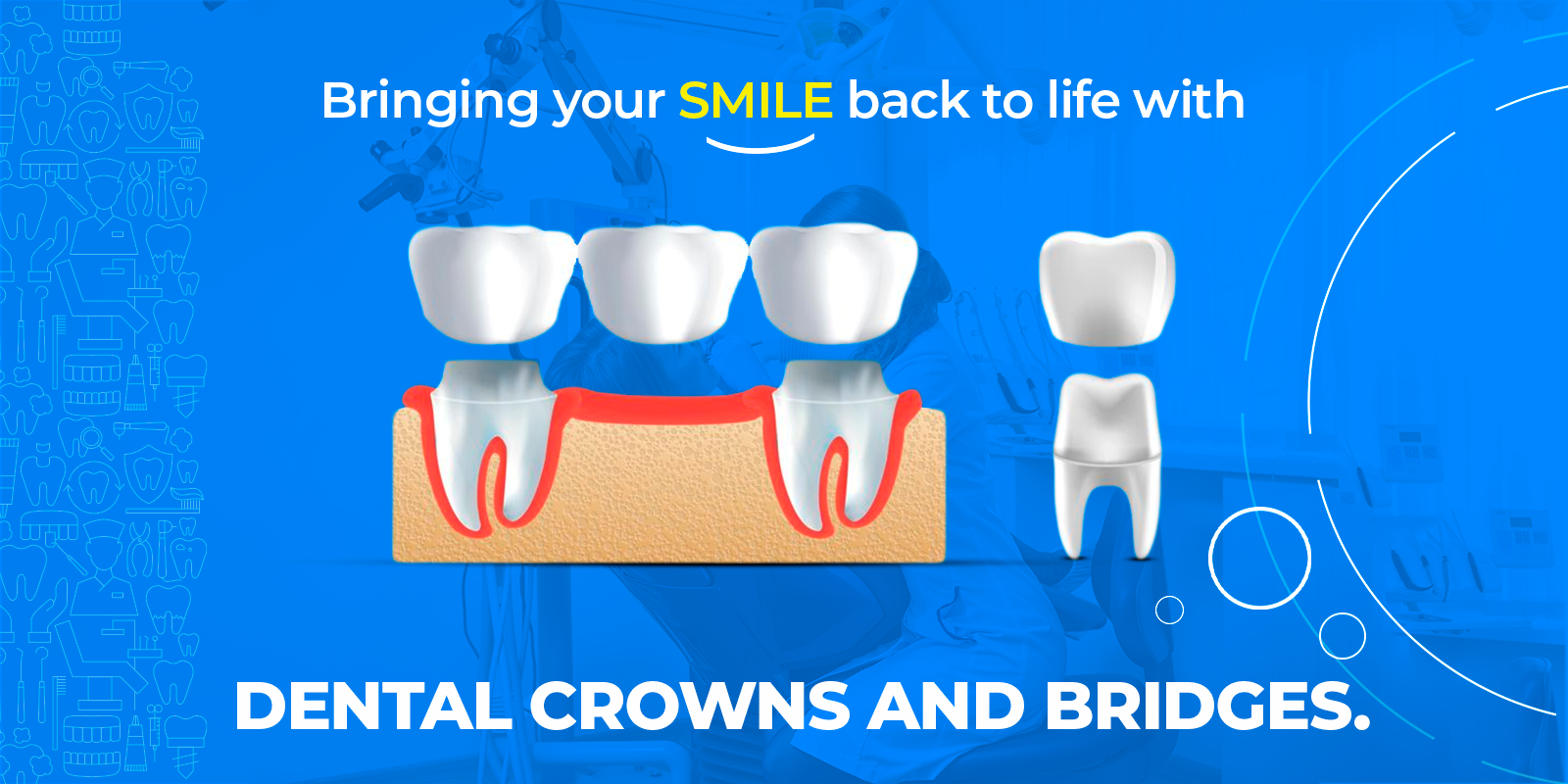
Dental Crown and Bridges
The Dental crowns are covers that are placed over decayed and damaged teeth. When fillings don't work, crowns are used to protect, cover, and restore the form of your teeth. Dental crowns are composed of various materials, including metals, porcelain, resin, and ceramics. They don't require special treatment other than daily good oral care in the long run.
What Are Dental Bridges?
A bridge is a tooth or several porcelain teeth that fill the space left by a missing tooth and are held by neighbouring teeth or implants. As an alternative to dental bridges, partial dentures are employed. Dental bridges are a standard solution for missing teeth, and dentists have used them for many years. They are of different types. Your dentist would suggest the right one for you.
When are Dental Crowns and Dental Bridges needed?
The following circumstances need the use of dental crowns and bridges.
- If you need a root canal
- For the sake of appearance
- On a tooth that was on the verge of shattering
- Following Implants
Why are Dental Crowns and Bridges needed?
If you have missing teeth in your mouth, you will most likely require dental crowns and bridges. Several factors may necessitate the use of a dental crown, including the following:
- To Protect a weak tooth from breaking (perhaps due to disease) or keeping a cracked tooth together.
- A damaged tooth or one that has been significantly worn down can be restored.
- Crowns are used to cover an extensive filling and support a tooth that has little tooth structure left.
- The adjoining tooth crown anchors a dental bridge.
- Misshapen or excessively stained teeth can be disguised with dental veneers.
- A dental implant is covered with a dental crown.
- A tooth that has had a root canal is covered with a crown.
What are the advantages of this procedure?
They replace the missing tooth with one that looks as natural as the original to restore the appearance of your smile. A dental bridge can be used to:
- Assist your bite.
- Prevent the remaining teeth from shifting.
- Get your chewing and speaking abilities back.
- Restore your smile
When does a person feel they require Dental Crowns and Bridges?
- Your teeth have deteriorated.
- You are missing one or more teeth.
- The teeth surrounding the lost tooth have sufficient bone mass.
- You have mismatched teeth or teeth that are too closely spaced.
Process of Dental Crowns and Bridges
For Dental Crowns:
The dentist will prepare the tooth by removing decay and contouring the surface to suit the crown appropriately.
The temporary dental crown will then be secured in place with temporary dental cement (also known as dental adhesive), and your bite will be examined to verify that you are biting correctly.
The temporary crown is removed in the second session, the teeth are cleaned, and the new crown is carefully attached with permanent dental cement to ensure proper spacing and occlusion.
For Dental Bridges:
- Initial Consultation
The dentist will evaluate your condition and provide recommendations for the best course of action. You’ll be scheduled for the main procedure if you get the green light.
- Preparation on the Bridge
To avoid pain and keep you calm, the dentist first numbs the area around the missing tooth. After that, the dentist cleans the region to eliminate any bacteria and plaque.
The neighbouring teeth are then shaped to allow the crown to fit correctly (for traditional and cantilever bridges). The dentist creates the final prosthesis by scanning and taking impressions of the teeth and sending them to a lab.
Your dentist will choose dental crowns to match the colour of your natural teeth. To protect the teeth from harm, a temporary bridge is bonded on them. When the permanent bridge is ready, you'll be sent home and called into the bridge's dental office.
- Final Cementation
The dentist will remove the temporary bridge and replace it with the permanent one once the permanent bridge is finished. If the bridge fits correctly, the dentist will use more vital cement to secure it. The bridge is polished to make it look as natural as possible by removing the excess cement. You'll be prepared to return home.
FAQ
Will a crown necessitate a root canal?
No, not every tooth that receives a crown requires a root canal, and a root canal is usually finished before a crown is firmly attached to the tooth. People that have had a root canal treatment typically need a crown.
What is the expected lifespan of a dental crown?
Contrary to popular perception, dental crowns do not last indefinitely, and they can endure an extended period if adequately cared for. According to current studies, over 90% of crowns will not require substantial treatment within five years.
What Are Dental Bridges' Advantages?
A lost tooth can lead to a range of problems in your mouth, including bone degeneration and shifting your other teeth. We prescribe a dental bridge to prevent either of these things from happening.
What would be the cost of the procedure?
The cost of the procedure will lie between the range of Rs 2000 to 16000.
